Introduction
In an era where digital transformation is accelerating at an unprecedented pace, securing cloud environments has become a paramount concern for organizations worldwide. The multifaceted challenges of cloud security—ranging from data breaches and compliance issues to insufficient access controls—demand a rigorous and strategic approach. As enterprises increasingly adopt hybrid and multi-cloud strategies, the necessity for robust security frameworks and best practices has never been more critical.
This article delves into the intricate landscape of cloud security, exploring the essential roles within cloud security consulting, strategies for effective security assessments, and the implementation of best practices. Additionally, it highlights the importance of selecting the right cloud security consulting partner and the invaluable benefits these services provide in fortifying digital infrastructures. Through comprehensive insights and practical guidance, this exploration aims to empower organizations to navigate the complexities of cloud security with confidence and resilience.
Understanding Cloud Security Challenges
Cloud protection challenges are multifaceted, encompassing data breaches, compliance issues, and insufficient access controls. Organizations often face challenges with the shared responsibility framework, where both the service provider and the customer have duties for protection. 'Misconfigurations, lack of visibility, and inadequate incident response plans can exacerbate these challenges, necessitating a robust protection strategy.'. The connection between protection and expenses in the digital sphere is more interconnected than one might assume: constructing effectively can both lower expenses and prevent harmful individuals from accessing the environment, and tracking costs can uncover malicious entities exploiting resources for unlawful purposes. Based on an extensive survey of 927 cybersecurity experts globally, 78% of organizations are choosing hybrid and multi-cloud strategies, emphasizing the critical need for a structured approach and best practices for protection in these environments. As Corey Quinn highlighted, some cloud services continue to be unjustifiably underused by clients, further complicating the protection landscape. Efficient data handling and categorization are vital as data gathering, preservation, and examination expand, guaranteeing more rigorous protective measures are implemented for sensitive information.
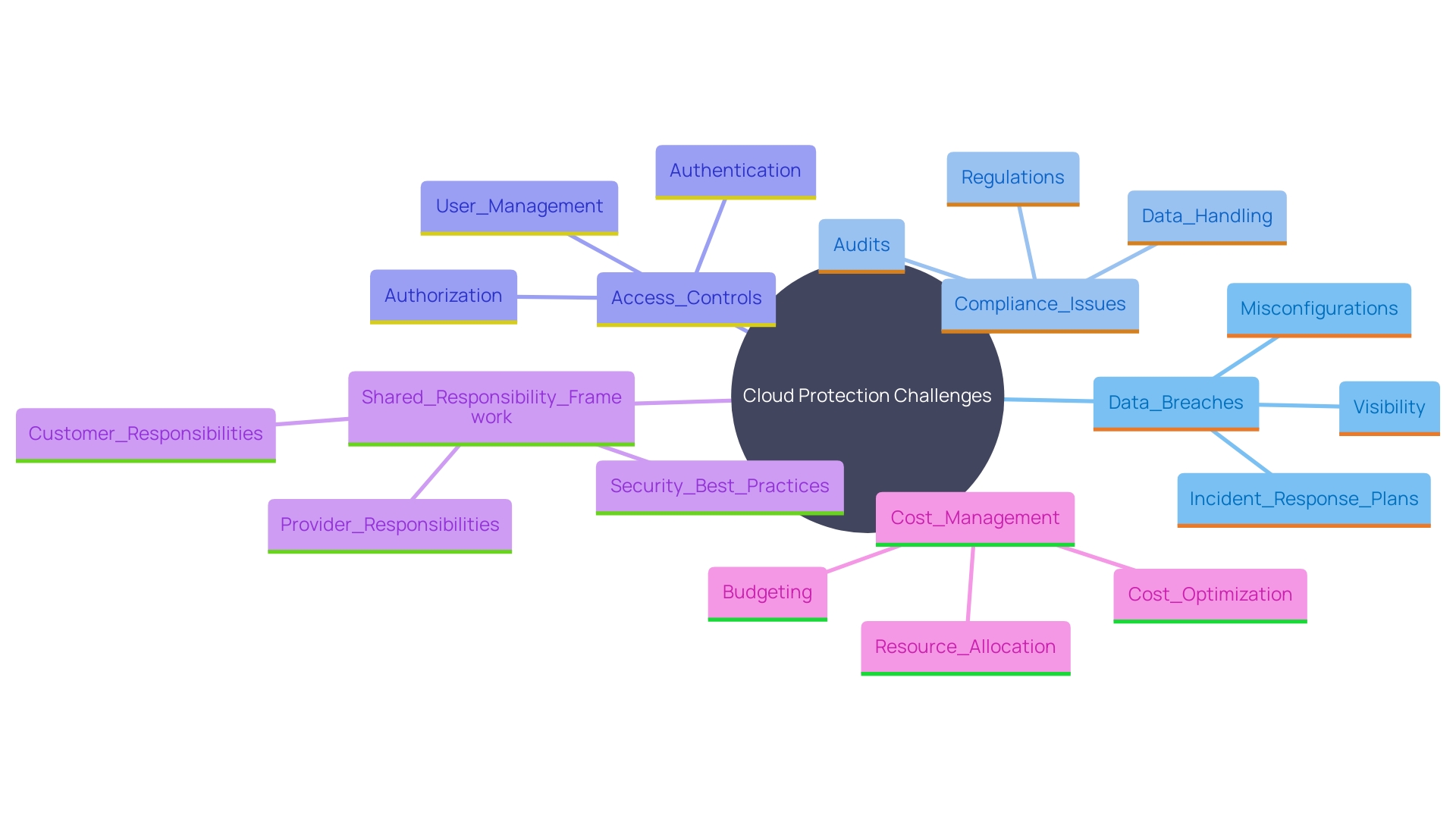
Key Roles in Cloud Security Consulting
Cloud security consulting is a multi-faceted discipline involving several key roles such as security architects, compliance specialists, and risk assessors. Security architects are responsible for creating strong and safe digital environments, ensuring that the infrastructure is resilient against potential threats. This role is crucial, as illustrated in a recent AWS incident where attackers attempted unauthorized access by exploiting SES limits, underscoring the need for secure architecture.
Compliance specialists play a vital role in ensuring that cloud environments adhere to various regulatory standards like GDPR and HIPAA. Their work is critical in maintaining legal compliance and avoiding hefty fines. For instance, companies like Snowflake emphasize protection as part of their core operations, streamlining processes to prevent vulnerabilities from slipping through the cracks.
Risk assessors are essential to identifying and evaluating potential vulnerabilities within the online infrastructure. They recommend strategic mitigation measures to prevent breaches. A recent interview with Corey Quinn highlighted how monitoring expenses can reveal malicious activities, such as resource hijacking by attackers. This proactive stance significantly reduces the risk of data breaches and other safety incidents.
The transition to online services has made these roles more crucial than ever. According to recent statistics, three-quarters of professionals in the field view the current threat landscape as the most challenging it has been in the last five years. This increasing intricacy highlights the need for specialized positions in digital consulting to safeguard and strengthen technological infrastructures.
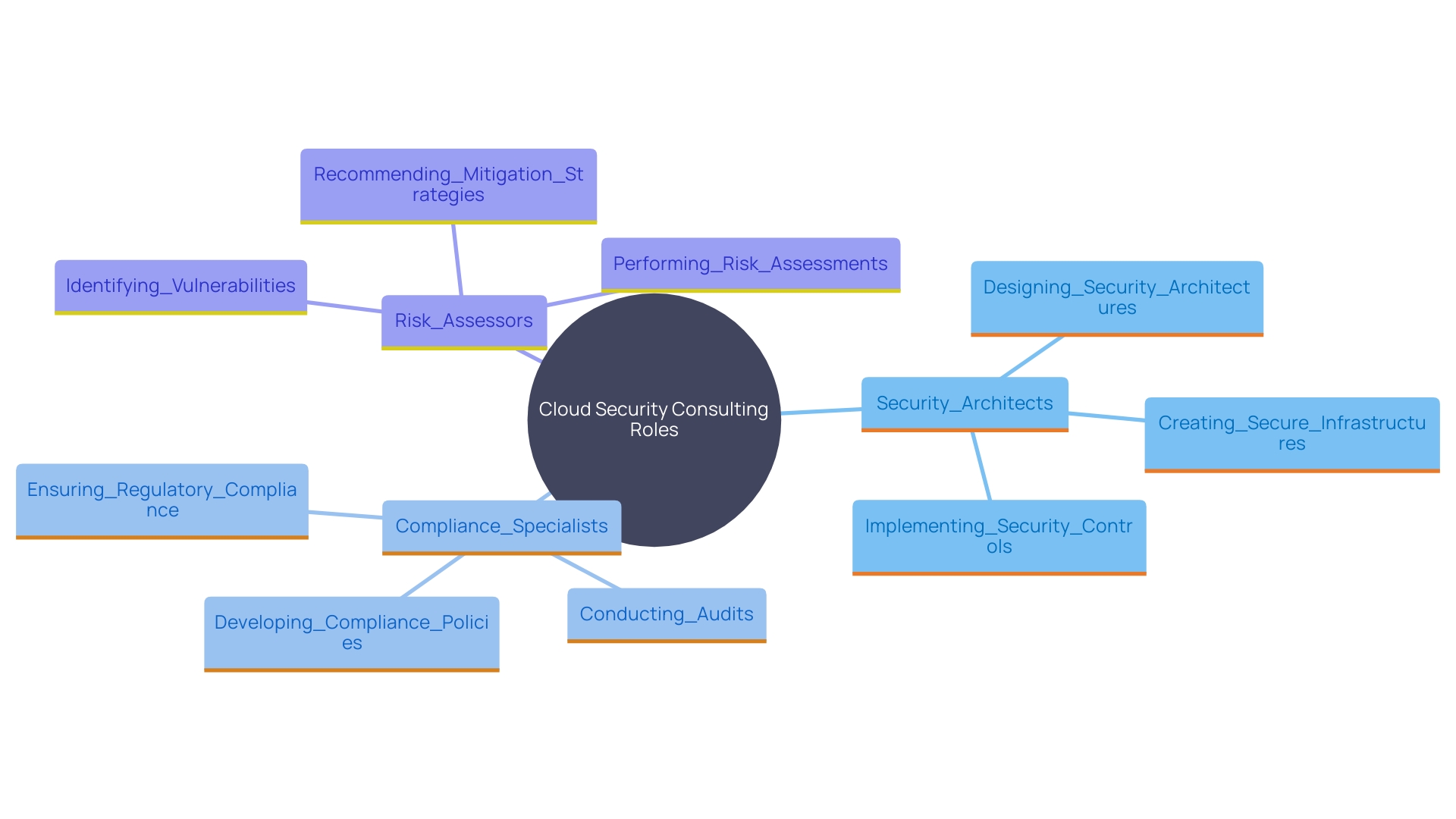
Cloud Security Assessment and Strategy Development
Carrying out a comprehensive assessment of online protections is crucial for detecting weaknesses and deficiencies in current safety protocols. This process involves a comprehensive analysis of the current infrastructure, information classification, and risk evaluation. For instance, a notable incident involved a support case in an AWS account being exploited to increase SES sending limits, highlighting the importance of proactive assessment (Case Study).
Statistics suggest that data protection breaches are the primary incidents in digital environments, succeeded by improper use of services and configuration mistakes, highlighting the need for thorough assessments (Statistics). Furthermore, the incorporation of AI and ML technologies heightens the demand for new skills, with 49% of professionals in the field requiring AI-related expertise (Points).
Based on the assessment, a customized cloud protection strategy can be developed. This strategy should include specific policies, technologies, and best practices to improve safety and compliance. Adopting a Secure by Design approach can greatly lessen the effect of vulnerabilities and assist in balancing agility and cost optimization with safety objectives (Quotes).
Furthermore, evolving threats such as those from cyber actors targeting various sectors emphasize the need for continuous adaptation and vigilance (News). Efficient online protection evaluations and approaches are essential for safeguarding infrastructure and ensuring robust operations.
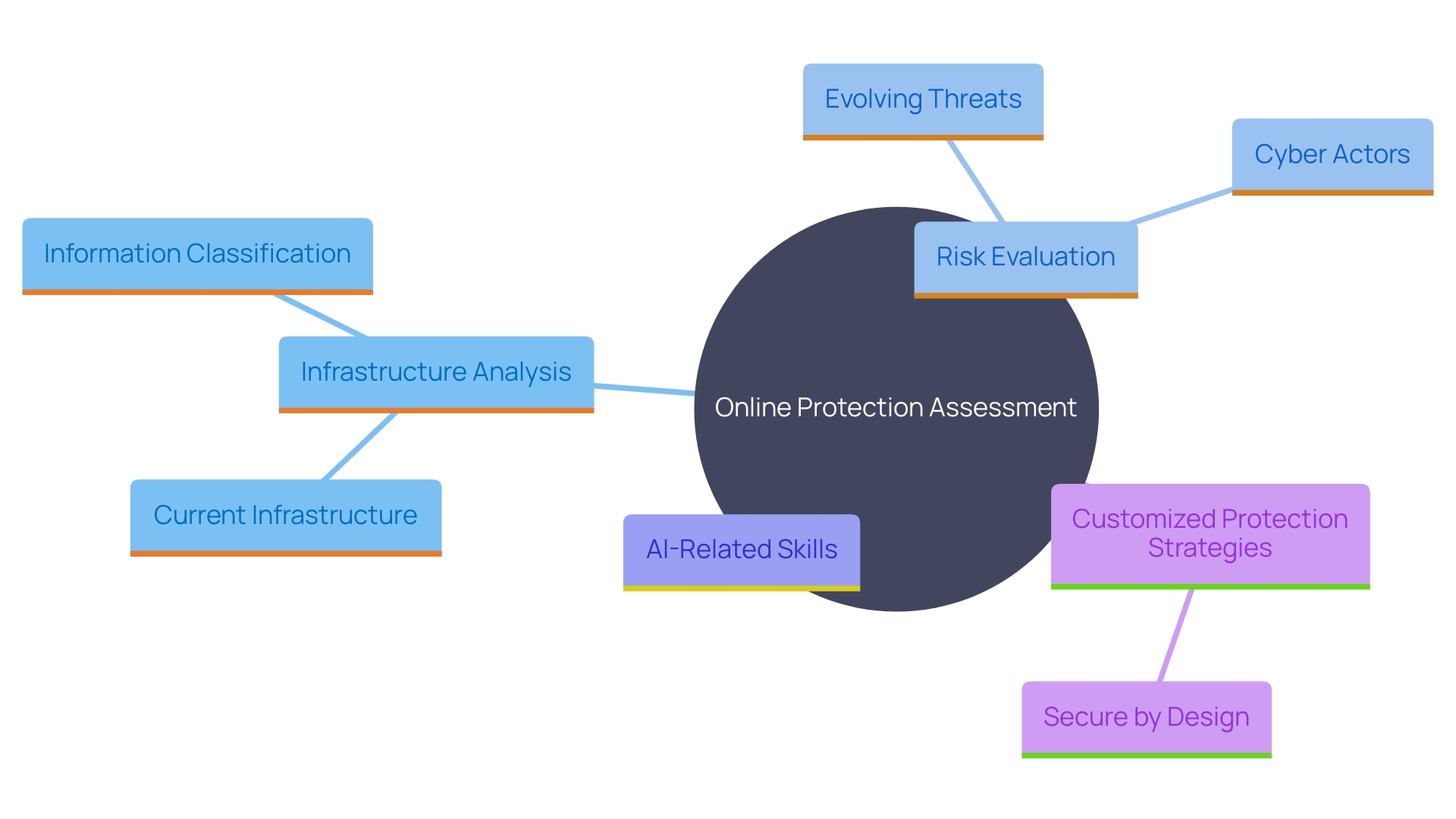
Implementing Cloud Security Best Practices
Applying thorough security measures for online storage is essential for safeguarding against cyber threats and maintaining the integrity of internet-based information, applications, and infrastructure. Organizations must establish robust identity and access management (IAM) protocols, utilize encryption for data at rest and in transit, and continuously monitor online environments for anomalies. The adoption of a zero-trust model is essential, where every access request is authenticated, authorized, and encrypted, minimizing the risk of unauthorized access.
The Security Alliance's report on the "Top Threats to Computing 2024" highlights the increasing sophistication of attacks and the expanding complexity of ecosystems. This necessitates extending protective measures to vendors and partners, emphasizing the importance of a secure-by-design approach.
Service providers and their clients share the responsibility for securing the environment under the shared responsibility model. CSPs such as Microsoft Azure, AWS, and Google Cloud Platform oversee protection related to the online infrastructure, while end-users must safeguard the information and assets they store.
Routine training for staff is also essential to strengthen awareness and avoid human mistakes. As pointed out by CyberArk’s specialists, in online environments, protection fundamentally revolves around identity management. Making certain that staff are knowledgeable about safety procedures can greatly lower the chances of breaches resulting from improper use or misconfiguration.
Following online data protection standards aids in preventing legal and monetary consequences, as failing to meet requirements can result in fines, penalties, and harm to a company's reputation. Applying these best practices not only protects sensitive information but also guarantees adherence to industry standards and data protection regulations.
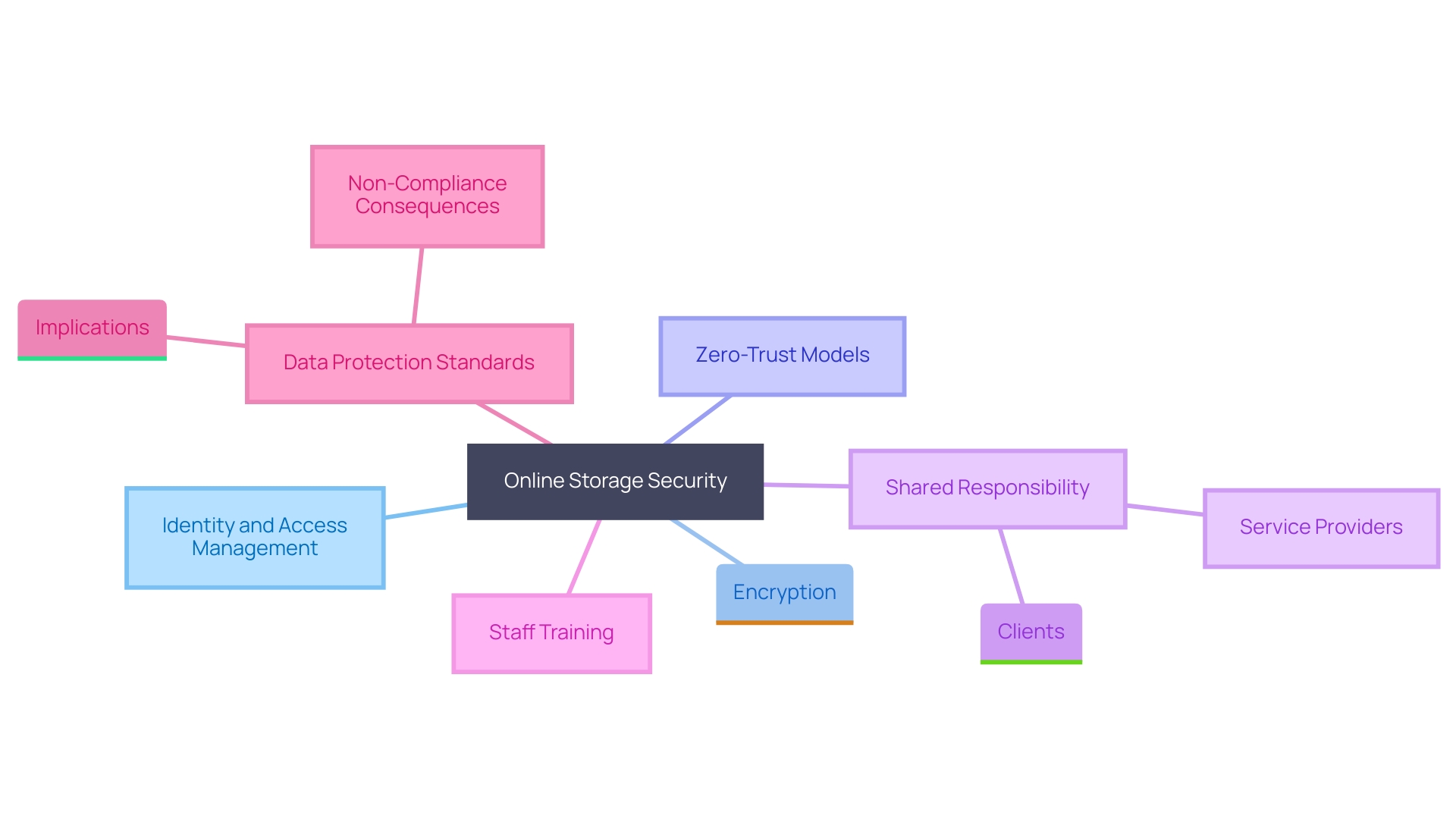
Choosing the Right Cloud Security Consulting Partner
Choosing the appropriate consulting partner for online protection necessitates a detailed assessment of their skills, sector experience, and the extent of their service options. This selection process should prioritize partners with a proven track record in areas such as risk evaluations, incident response, and compliance management. The growing importance of online protection, fueled by digital transformation and telecommuting, highlights this necessity. For instance, during a recent AWS incident, a client discovered unauthorized access triggered by a suspicious support case, highlighting the critical need for robust incident response capabilities.
A cooperative method is crucial, ensuring the partner aligns with your organization's specific protection requirements and business goals. According to a survey of 927 cybersecurity professionals, 78% of organizations are adopting hybrid and multi-cloud strategies, which necessitates a partner adept in managing complex environments. The evolution of cybersecurity, from asset discovery to advanced behavioral detections, demonstrates the importance of selecting a partner who can adapt to and address evolving threats effectively.
As Lynn Greiner, a tech industry expert, emphasizes, online protection products should address multiple areas, including vulnerability management, detection and response, compliance, and reporting. This comprehensive capability is essential in safeguarding applications and information in the digital environment, making the choice of a flexible and experienced partner for protection crucial.
Benefits of Cloud Security Consulting Services
'Utilizing cloud protection consulting services empowers organizations with the specialized knowledge required to traverse the intricate realm of contemporary cybersecurity.'. These services are instrumental in optimizing protective measures, mitigating risks, and ensuring compliance with critical regulations such as ISO 27001. This globally recognized standard for information protection management systems (ISMS) emphasizes a systematic approach to managing information-related risks through risk assessments, defined protection policies, and continuous improvement.
Consultants offer invaluable perspectives on emerging protective technologies and trends, ensuring organizations stay ahead of potential threats. For instance, the evolution of cybersecurity has seen the development of advanced solutions like asset discovery and behavioral detections, which help in identifying and mitigating sophisticated cyber threats effectively. By utilizing the latest advancements, organizations can improve their overall protection stance and safeguard their cloud environments against unauthorized access, data breaches, and other cyber threats.
Moreover, these consulting services can assist in crafting a tailored transition plan to cloud-managed services, ensuring a seamless migration and robust support system. Partnering with providers who have a proven track record and strong security measures is crucial for aligning with the organization's needs and goals. The continuous refinement of cybersecurity strategies, often through collaborations with experts, further strengthens the organization's defenses, making it resilient against evolving threats.
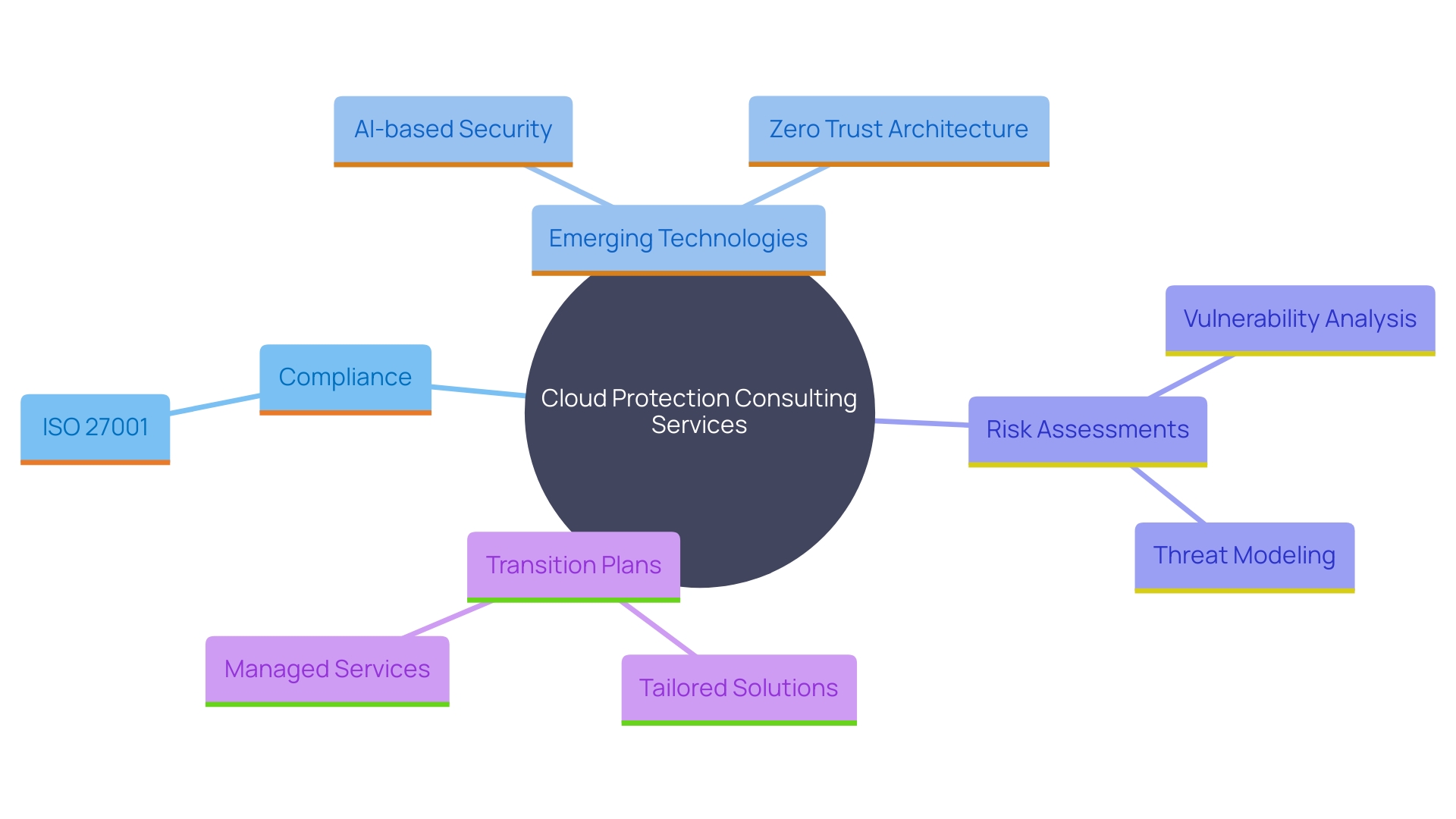
Conclusion
The complexities of cloud security present significant challenges that organizations must address to protect their digital assets effectively. From data breaches and compliance issues to the intricacies of the shared responsibility model, the landscape demands a strategic approach. Organizations must recognize the critical importance of effective data management and the need for robust security frameworks, particularly as hybrid and multi-cloud strategies become increasingly common.
Key roles within cloud security consulting—such as security architects, compliance specialists, and risk assessors—are essential for designing secure environments and ensuring regulatory adherence. These professionals play a pivotal role in identifying vulnerabilities and recommending mitigation strategies, reinforcing the need for specialized expertise in the face of a challenging threat landscape. The continuous evolution of security needs underscores the necessity of thorough assessments and the development of tailored strategies to safeguard cloud infrastructures.
Implementing best practices is paramount for organizations looking to fortify their cloud environments. Establishing strong identity and access management protocols, adopting a zero-trust model, and ensuring regular employee training are vital steps in minimizing risk. Furthermore, selecting the right consulting partner can significantly influence an organization’s security posture, as partners with proven expertise can provide invaluable insights and support in navigating the complexities of cloud security.
Engaging cloud security consulting services offers organizations the opportunity to optimize their security measures, mitigate risks, and remain compliant with industry standards. By leveraging the expertise of specialized consultants, organizations can enhance their defenses against evolving cyber threats, ensuring the security and integrity of their cloud-based operations. In a rapidly changing digital landscape, prioritizing cloud security is not just a necessity but a strategic imperative for long-term success.




